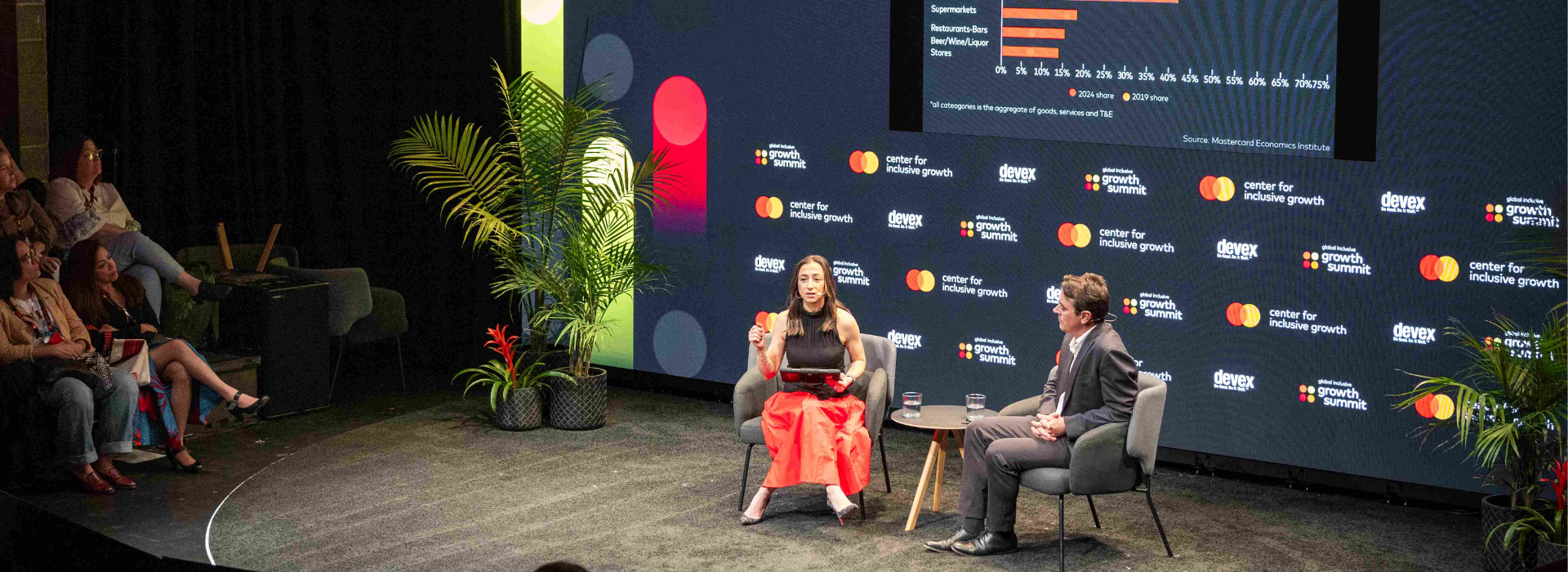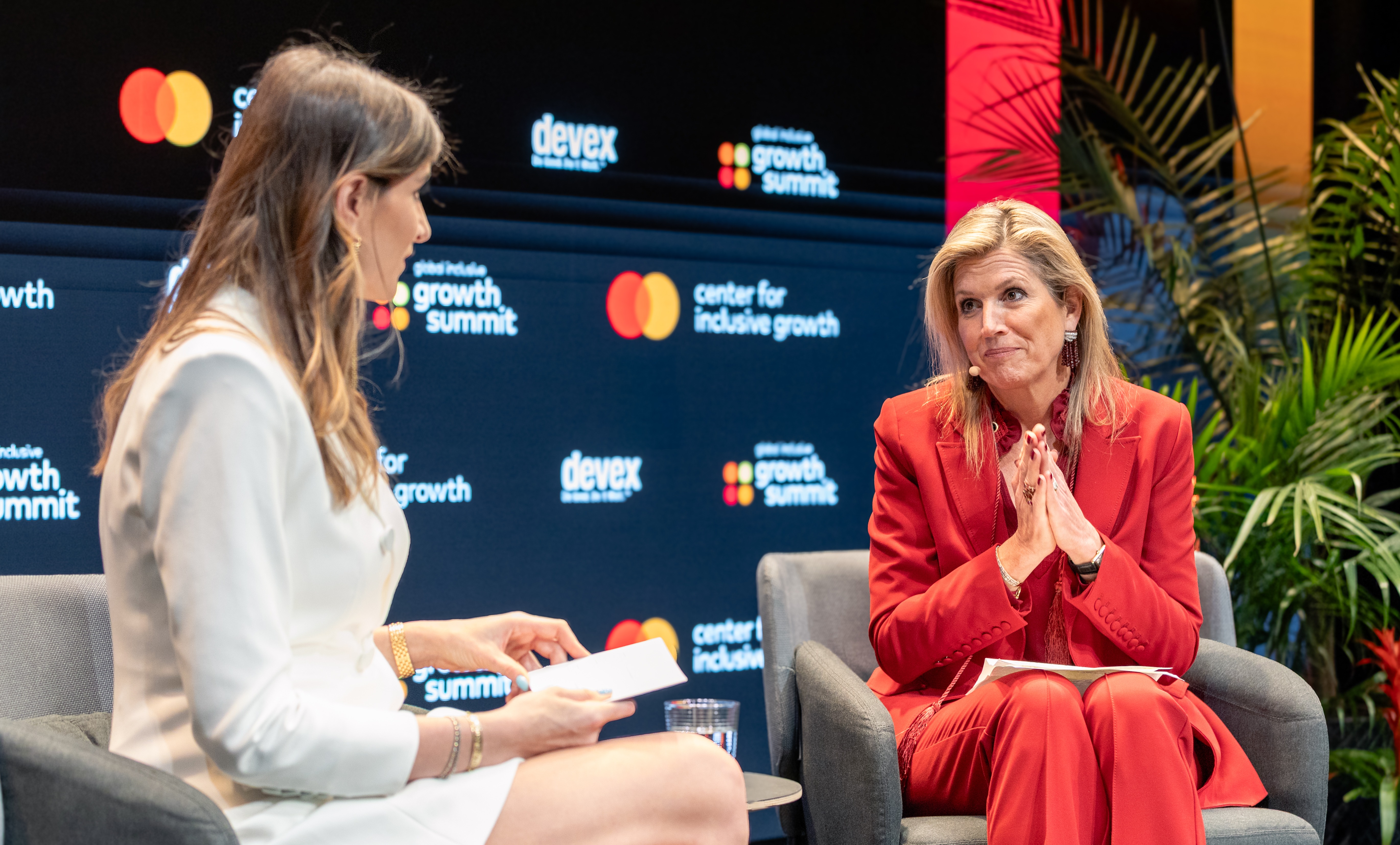Trust, tech and transformation
May 6, 2025 | By Vicki Hyman
These are truly dizzying times, but if there was a single takeaway from the Global Inclusive Growth Summit held last month in Washington, D.C., it was this: The world can’t afford to heed the standard advice for vertigo — sit down, lie still.
In fact, uncertainty can be an opportunity for action, said Shamina Singh, the president and founder of the Mastercard Center for Inclusive Growth, which organizes the annual summit. “That’s what is needed now more than ever,” she said. “New ways of thinking, new ways of doing, new partnerships that are purpose-built for the world as it is right now, but also how it will be tomorrow.”
Among the challenges raised by the policymakers, philanthropists, futurists, NGO leaders and others in the packed auditorium: How do we drive economic growth so people everywhere can reach financial health? How do we foster digital transformation without leaving small businesses vulnerable to growing cyber threats? What kind of leadership is needed in times of change?
“We have to anticipate now that those once-in-a-decade events are every year,” said Henry Timms, CEO of the global consultancy Brunswick Group. “Leadership during uncertain times requires balancing immediate challenges with long-term vision.”
Here are three key insights from the summit:
01
It takes a village to build financial health.
You can’t measure someone’s financial health by the balance in their bank account or their annual salary, said Haley Sacks, the financial influencer known as Mrs. Dow Jones, in a conversation with Queen Máxima of the Netherlands, the U.N. secretary-general's special advocate for financial health. “Having a gym membership doesn’t mean you’re going to have a six-pack,” Sacks said.
Queen Máxima called on financial institutions to listen more carefully to their customers and their needs, and to develop and test tools that people will use to grow financially – and therefore grow as customers too. Employers can also play a greater role in supporting financial health, she said, with initiatives like automatic savings that can provide a buffer for emergencies, improving employees' peace of mind and productivity.

Haley Sacks, aka Mrs. Dow Jones, left, with Queen Máxima, right, discussing ways to boost financial health for people around the world.
As digitization makes deeper inroads across sectors, organizations can work together to create more comprehensive financial services. “I think you do not see people emerge securely into the middle class until they have an entire toolbox, not one tool like insurance,” said Andy Kuper, CEO of LeapFrog Investments, during a panel on impact investing. “So I'm hopeful that if we as a world — and that especially requires investors to be smart — back the right kinds of companies, that you will see many billions of people with this toolbox.”
Despite the current economic turbulence, the middle class continues to grow globally, with already half of the global population in that income group, and projections indicating more than a billion people will join it in the coming decade, primarily in Asia, said Wolfgang Fengler, CEO of World Data Lab, in a session on the new global consumer with Michelle Meyer, chief economist of the Mastercard Economics Institute.
“Don’t bet against digital,” Fengler said, “and don’t bet against the middle class.”
02
Trust is the currency underpinning economic growth in the digital world.
“I am optimistic that cybersecurity is table stakes — it’s increasingly understood that it is the starting point to an inclusive world,” said Mastercard CEO Michael Miebach.
Yet the gap between those with strong cyber defenses and those without is widening at a time when technology has enabled more sophisticated and convincing scams, attack vectors are expanding, and trust in digital spaces is breaking down.
Rebuilding trust starts at the individual level: “We need to reclaim control of personal data, which is essential to one's identity and personhood," said Frank McCourt, executive chairman of McCourt Global and founder of Project Liberty. He called for “an intention economy over an attention economy, where individuals benefit economically from their data."
At the systemic level, cyber threats should be viewed as a business and leadership issue, rather than merely a technical one. “They are a central risk to global economies, to critical infrastructure and to public trust,” said Alissa “Dr. Jay” Abdullah, Mastercard’s deputy chief information security officer.

Public-private cooperation is critical, Miebach said, from cyber training and capacity building to real-time information sharing. “There's a fragmentation of the world that we're currently witnessing, where people look more inside, and this [gets] in the way of sharing effectively,” he said. “The way to defending is by sharing, being close.”
Criminal organizations don’t recognize borders, said Valdecy Urquiza, secretary general of INTERPOL. “The threats are coming from everywhere … We have got to foster collaboration — cross-border collaboration, cross-sector collaboration — we’ve got to make sure that everyone is included.”
03
Invest in closing the digital divide, wherever it exists.
Whether it’s Alabama or Angola, Montana or Malawi, rural innovation requires addressing fundamental infrastructure needs such as broadband access while also developing skills-based education programs that connect people to higher-paying jobs.
Connectivity is one area of critical concern worldwide – as Amy Doherty, chief information officer at the World Bank half-joked, “I love the new Maslow's hierarchy of needs that has Wi-Fi at the bottom.”
In the U.S., that requires more coordination between local, state and federal governments, and with the private sector. “If you don't have access to high-speed internet, you simply can't compete,” said Ross DeVol, CEO of think tank Heartland Forward. “It is the number one economic challenge for many of these rural locations.”
Julie Gehrki, president of the Walmart Foundation, said employers should work closely with states to close the skills gap — making sure community college classes address the changing needs of the job market. “If you're investing in a company in rural America that's now going to need people with tech skills, how are you making sure they know the demand there, they know the training program that's relevant, and that they can sign up to be a part of that transformation?”
Another key focus area is Africa, which is on the cusp of becoming a bigger global economic player thanks to its modern technology adoption, a young digital-native population, and creative industries. With more investment in the electricity infrastructure of sub-Saharan Africa, AI could even help emerging economies leapfrog developed ones, Doherty said. Take agriculture — agribusiness could use AI to give tailored advice to farmers about their land and help them increase crop yields, which in turn helps their community thrive, she said.
At the close of the day, Jon Huntsman, Mastercard’s president of Strategic Growth, spoke with James Mwangi, chief executive of African financial services company Equity Group Holdings, which is part of the MADE Alliance, launched by Mastercard and the African Development Bank to extend digital access to critical services to 100 million people and businesses in Africa.
“A transformed Africa is a sustainable world,” Mwangi said. “Africa is not coming out on this stage as a beggar. It's coming with this human resource to serve the world. It's coming with its agricultural potential to secure.”
Banner photo, Mastercard Economics Institute Chief Economist Michelle Meyer, left, discusses consumer spending habits and the resilience of the middle class with Wolfgang Fengler, right, CEO of the World Data Lab.
Video
More from the Global Inclusive Growth Summit
Unlocking opportunity
In this discussion between Bahrain's Minister of Finance and National Economy H.E. Salman Al Khalifa and Shamina Singh, president and founder of the Mastercard Center for Inclusive Growth, an announcement about the launch of Mastercard Strive in the country signals the power of cross-border partnerships.
Closing the cyber divide
As the global economy digitizes, the gap between those with strong cyber defenses and those without is widening — threatening both security and growth. Mastercard CEO Michael Miebach and INTERPOL Secretary General Valdecy Urquiza talk with Alissa "Dr. Jay" Abdullah, Mastercard's deputy security officer, about investing in trust, infrastructure, and global collaboration.
Africa's finance revolution
With the next billion consumers coming online — and a surge of innovation across finance, commerce and technology — Africa is leading a dynamic economic transformation. Mastercard's Jon Huntsman and Equity Group Holdings' James Mwangi discuss how public-private collaboration can unlock new markets, empower small businesses and build digital infrastructure that serves real people.